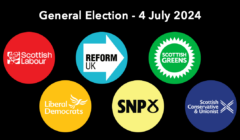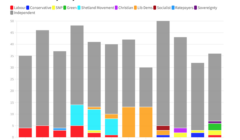Letters / How to finance fixed links …
Following discussions (supported by the local MP and MSP) held locally recently regarding fixed links and related autonomy, the question may arise “who is going to pay for it all”.
New, inexperienced, Fiona Hyslop, Scottish transport minister, when interviewed said it was not in Holyrood’s reach.
Therefore it is necessary to remind and inform Scottish administrations that in broad terms Shetland’s finances can be divided into two streams: revenue/expenditure and capital investments/infrastructure projects, such as fixed links.
Consider the following: Funds for fixed links are needed the politicians will cry, but it is not money per se that is required but credit.
Banks create money for mortgages out of thin air by double debit/credit entries on a spreadsheet. Their activity is governed by the central bank – the Bank of England who perform the same conjuring trick, but can never go bust as the BoE issues its own/our currency – Sterling.
By sleight of hand the BoE buys UK Treasury bonds-gilts (IOUs) with its own currency, providing back in return to the Treasury (i.e. the government) pounds to dispense as it sees fit – fixed links perhaps?
This methodology can be seen in its greatly expanded balance sheet to cover the Covid crises.
That’s how the UK Government finances itself/us, but with a little bit of financial ingenuity and accounting Shetland could bypass the Holyrood and Westminster budget straitjackets with their needless austerity consequences, which are not of Shetland’s making.
In effect Shetland should have an account directly with BoE.
Hyslop/SNP/Holyrood maintain that Scotland couldn’t do so as they do not hold the “levers of power”. Even if Scotland was independent, it is extremely unlikely that the markets would lend Holyrood the money by purchasing bonds, issued in a Scotch Punt currency (of suspect value?) etc, as they have no credit rating in the international markets.
Shetland would face continued mal-administration, rusting ferries, austerity, depopulation and no tunnels – for evermore.
In the first instance the UK Government should be financing Shetland’s capital projects such as fixed links (it is in the UK’s national interest to do so), and there has been much talk about ‘infrastructure’ by both governments.
However, Shetland should not have to use any of its investments or reserves for large capital infrastructure projects because in the UK ZCC Act 1974 these were never intended for that purpose.
But should Shetland consider following its own route, its credit rating will be AAA+ having oil gas energy fishing backing as collateral.
Shetland’s relationship with the UK should be based on the following: Shetland provides oil, gas, energy, fish to the UK and in return UK meets Shetland’s requirements – revenue/expenditure + capital infrastructure, defence etc.
Similarly Shetland could also issue bonds (IOUs) to the BoE to obtain their funds in return, to finance fixed links. These bonds backed by the BoE will show the repayment date and interest rate.
Perpetual Bonds have been issued (Consols as far back as 1751) whereby the principal is never paid back only the regular interest. In such an event Shetland would only have to pay the interest – back to the BoE, who would hold the bonds as security against the fixed links assets.
Consequently it shouldn’t be necessary to have the bonds traded outside on the secondary market. The fixed links would by themselves be an appreciating BoE asset, and therefore interest payments (if any) might not be necessary.
Mr W. Polson in his recent dispatches has already described the very large sums (and CO2 benefits) “saved” by replacing ferries by tunnels, which sums can then be added to and support the benefits of perpetual bonds and the payment of any possible interest.
Furthermore – if such an arrangement can be devised to finance fixed links, a logical step would be to use the same strategy for
Shetland’s entire economy separate from the Westminster and Holyrood mal-administrations, and interference (ie autonomy or Crown dependency).
That would have many advantages for Shetland but also for the two governments. A win/win situation for all parties with fixed links considered an investment on the BoE balance sheet.
Holyrood wouldn’t need to include Shetland in its finances, but could use those funds elsewhere, as would Westminster. The
Crown (and hence its subordinate Westminster and Holyrood parliaments) would maintain the strong connection with Shetland but with its finances off governments’ balance sheets.
Interested parties take note and be guided accordingly.
Cecil Robertson
Inverness






































































